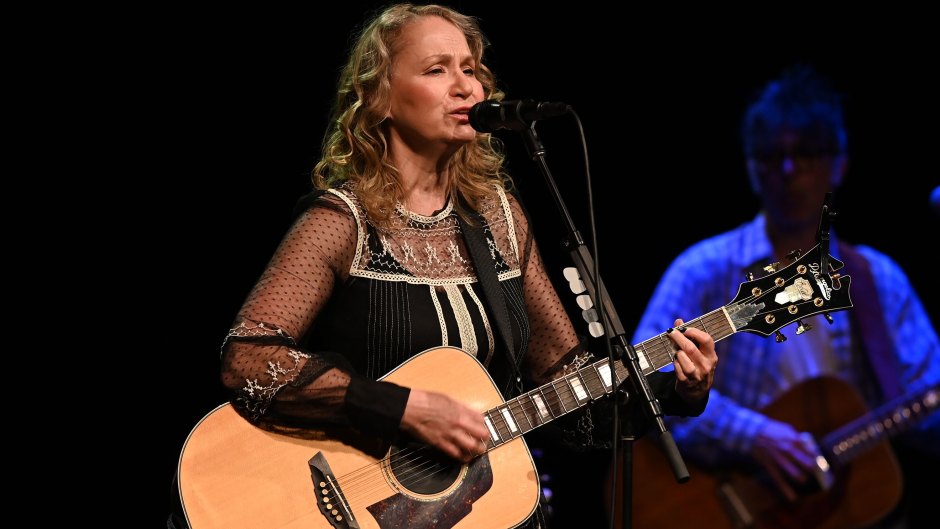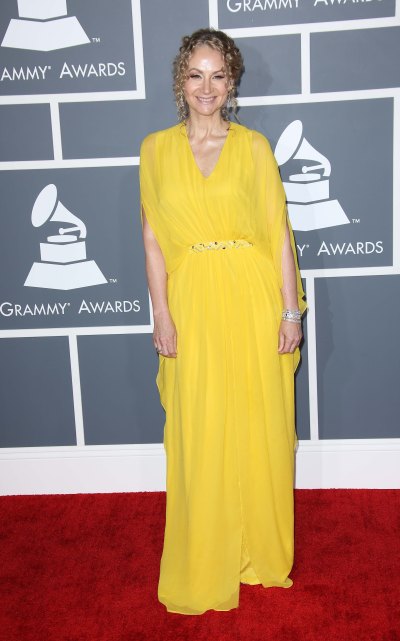
Larry Marano/Shutterstock
‘One of Us’ Singer Joan Osborne Says Having a Daughter ‘Changed Everything’ About Her Life
Growing up in Anchorage, Kentucky, Joan Osborne never dreamed of becoming a successful singer. “I lived in a little town, and [if you shared] any sort of thought like that, people would think you were crazy!” Joan, 58, tells Closer with a laugh. It wasn’t until she studied filmmaking at NYU that she “accidentally stumbled upon” a blues music scene and started performing at open mics.
Seven Grammy nominations later, the “One of Us” singer has carved out a long career with a large cult following, touring alongside her live-in partner, musician Keith Cotton, 53. Closer caught up with Joan after her City Winery Mother’s Day online benefit concert Can’t Be There Today to talk about her career, her upcoming album, Trouble and Strife, and raising her teenage daughter. Says Joan: “She has changed everything about my life.”
How are you doing in these strange times?
“We’re actually doing OK. We are fortunate to have a place that has a big yard where we can go outside. It’s hard in a lot of other ways. I have a daughter and she’s stuck at home with us. That’s not easy for her. And we lost all of our touring work, so we’re like, hmmm, how will we support ourselves? But we’re not as bad off as a lot of people are. So we’re grateful.”
What did you do on Mother’s Day?
“I just wanted to do some projects with [my daughter], some gardening, and I wanted her to act like she enjoys my company. [Laughs] She’s a teenager who spends most of her time in her room, so that was her present to me. My siblings and I did a Zoom call to our mother. It’s not easy to not be with her now. Thankfully, she’s 89 years old and in very good health.”
You recorded your biggest hit, “One of Us,” 25 years ago. What does it mean to you today?
“When I first recorded it, it felt like a little child tugging on your sleeve and asking you a question — “What if God was one of us?” — that you don’t have a ready answer to because you’ve stopped thinking about it. The song still has that power to connect with people, because it’s not telling them what to think. It’s asking what they believe. I think that’s why I’m not sick of singing it. We need to stay connected to that idea of, How do we treat each other if we are all made from God?”
What was it like to have such a big success?
“It was pretty intense, somewhat overwhelming. To have something that was meaningful to people on that massive a scale was incredibly rewarding and wonderful. But being a celebrity was not super comfortable for me. I liked being more of a private person, and it took that away from me for a while.”
You played the almost all-female Lilith Fair tour in 1997–’98. How was that experience?
“It was great because it was like a festival, but you got to see everyone day after day. I was such a fan of Emmylou Harris, and it was so great to go to lunch … and there’s Emmylou! Or see her perform, or have her say hello to you in the hallway. I became friendly with a bunch of people, the Indigo Girls in particular — I recorded with them. I also took for granted that women artists were just as valuable as male artists — no one told me, “You can’t have a female opening act.” It was a bit more rare and special than I realized at the time.”

What’s been your best star encounter?
“I did a benefit concert in Italy that Luciano Pavarotti used to do every year. We were sitting in the dressing room, and in bursts Elton John in a bright green suit! He said, ‘I love your record, you guys are great. I heard your soundcheck, it was wonderful. Really looking forward to seeing your show. Bye.’ It was like this whirlwind. I said, ‘Oh my God, that was Elton John!'”
Quite a big jump from Anchorage, Kentucky!
“It was a great place to grow up. I’m the oldest girl of six kids, and we had a lot of freedom to run around in the woods and in town. Everyone kind of knew each other, and people didn’t even lock their doors.”
You switched from wanting to be a documentary filmmaker to singing. Why?
“A guy in my building invited me out for a drink, and we went to the blues bar on the corner. My friend dared me to go up and sing a song. The piano player said, ‘You should come back here every Tuesday — we have an open mic night.’ And then I met musicians who told me about other places to sing. I was sort of amazed that people weren’t throwing rotten vegetables at me!”
You live and play music with your partner, Keith Cotton. What’s your secret?
[Laughs] Oh man. I think George Harrison’s widow said, ‘The secret to staying together is that you stay together.’ You let that be your priority. It’s wonderful sometimes, very challenging other times.”
How does your work affect things?
“Making music together will instantly change your perspective on your relationship. You can be in the midst of a terrible argument and then go onstage. It brings out parts of your soul that don’t come out in day-to-day living. There’s something very profound about it, so if you’re able to share that, it gives you a completely different perspective on your conflict. That’s been really key to us being able to work together and be a couple.”
Do you stay in touch with your family?
“We have a regular weekly Zoom call. It’s a little weird, but we fall into our typical family dynamic, with everyone talking over each other. We’re very opinionated, all trying to get a word in edgewise!”
How has raising a kid changed you?
“Being an artist, you’re absorbed in your own desires. That instantly takes a back seat. It also changed how I want to spend my time because I have her future in mind. There’s a lot of uncertainty and chaos, global warming is looming. This is my generation’s responsibility, and we need to do as much as we can about it so those that follow, like her, will have a fighting chance.”
Your last album was 2017’s Songs of Bob Dylan. What’s up next for you?
Bob Dylan recommended it on Facebook, and he doesn’t really do that, so it was very meaningful for us. I just finished a new record of original songs, Trouble and Strife, out September 18. Now I’ll see if I can cull together a rarities collection. And I want to see my daughter be a happy, well-adjusted woman in a world that appreciates her, and where she feels at home. A lot of things that held me back aren’t a problem anymore. I’ve been able to do so much, and have been so lucky.”
For more on this story, pick up the latest issue of Closer Weekly, on newsstands now!





































